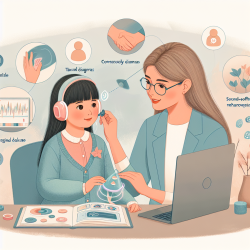The recent research article, "Changes in the immigrant Russian-speaking family language policy during the war in Ukraine," by Protassova and Yelenevskaya (2024), provides invaluable insights into how multilingual families adapt their language practices in response to geopolitical events. This blog will explore how practitioners can leverage these findings to enhance their skills and encourage further research in the field of speech-language pathology.
Key Findings from the Research
The study found that many multilingual families with Ukrainian roots have shifted towards using Ukrainian more frequently as a means of reinforcing cultural ties and expressing solidarity with Ukraine. Conversely, families involved in fields where Russian is prevalent have continued to prioritize Russian for educational and professional reasons.
Practical Applications for Practitioners
Practitioners can implement these findings in several ways to support multilingual children effectively:
- Encourage Cultural Awareness: Understand the cultural and emotional motivations behind language choices. Practitioners should respect and incorporate these motivations into therapy sessions.
- Support Language Flexibility: Promote a flexible approach to language use at home, encouraging parents to balance between maintaining their heritage language and integrating the dominant language of their new environment.
- Provide Resources: Offer parents resources such as bilingual books, online platforms, and community programs that support both languages.
- Monitor Emotional Well-being: Be attentive to the emotional impacts of language shifts on children. Sudden changes may cause stress, so gradual transitions are often more effective.
Encouraging Further Research
The complexities of identity formation and language transmission in multilingual families highlight the need for ongoing research. Practitioners are encouraged to:
- Participate in Longitudinal Studies: Engage in long-term studies to understand the evolving language dynamics in immigrant families.
- Collaborate with Multidisciplinary Teams: Work with psychologists, sociologists, and educators to gain a holistic understanding of the factors influencing language use.
- Utilize Social Media Data: Consider analyzing discussions from social media platforms as they provide real-time insights into parental concerns and strategies.
Conclusion
The war in Ukraine has significantly impacted language policies within Russian-speaking immigrant families, emphasizing the need for practitioners to adopt data-driven and culturally sensitive approaches. By understanding and implementing the research findings, practitioners can better support multilingual children and contribute to the broader field of speech-language pathology.
To read the original research paper, please follow this link: Changes in the immigrant Russian-speaking family language policy during the war in Ukraine.










